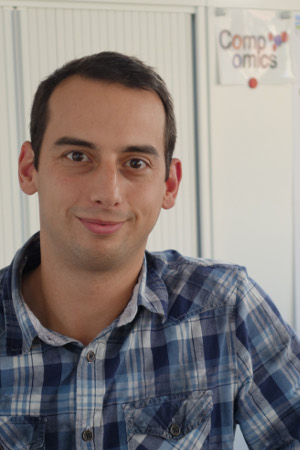Lennart Martens

Lennart Martens
tel.: +32 9 264 93 58
research unit: Computational Omics and Systems Biology Group (CompOmics)
website
Lennart Martens is a professor of Systems Biology at Ghent University, and Group Leader in, and Associate Director of, the VIB-UGent Center for Medical Biotechnology. His research interests focus on the application of Machine Learning to high-throughput data, and his current projects include the development of novel, advanced data processing and interpretation algorithms that are driven by artificial intelligence. Dr. Martens is a Fellow of the Royal Society of Chemistry, serves on the Board of the Belgian Proteomics Association, on the proteomics section of the Royal Chemistry Society of Flanders, and has been elected to the Human Proteome Organization (HUPO) Council, and to the HUPO Executive Committee. Dr. Martens has also been elected to the Belgian Young Academy, has been awarded the Prometheus Award for Research Excellence by Ghent University in 2014, and the Juan Pablo Albar ‘Proteomics Pioneer’ Award by the European Proteomics Association in 2015. An author on more than 220 research papers and two Wiley textbooks on mass spectrometry-based bioinformatics, has been lead organizer for two Dagstuhl Seminars on Computational Proteomics, and he also serves as Editor or Editorial Board member for Molecular & Cellular Proteomics, Molecular BioSystems, Proteomics, PLoS ONE, and PeerJ.
Keywords: Bioinformatics, Biomedical Analytics, Predictive modelling, High-throughput omics
- Kelchtermans P, Bittremieux W, De Grave K, Degroeve S, Ramon J, Laukens K, Valkenborg D, Barsnes H and Martens L (2014) ‘Machine learning applications in proteomics research: how the past can boost the future.’, Proteomics, 14, 353-366 (IF: 3.973).
- Gonnelli G, Stock M, Verwaeren J, Maddelein D, De Baets B, Martens L* and Degroeve S (2015) “A decoy-free approach to the identification of peptides”, Journal of Proteome Research, 14, 1792-1798 (IF: 5.001).
- Degroeve S, Maddelein D and Martens L (2015) “MS2PIP prediction server: compute and visualize MS2 peak intensity predictions for CID and HCD fragmentation”, Nucleic Acids Research, 43, W326-W330 (IF: 8.808).
- Argentini A, Goeminne LJ, Verheggen K, Hulstaert N, Staes A, Clement L and Martens L (2016) “moFF: a robust and automated approach to extract peptide ion intensities”, Nature Methods, 13, 964-966 (IF: 25.328).
- C Silva AS, Palmer A, Kovalev V, Tarasov A, Alexandrov T, Martens L* and Degroeve S. (2018) “Data-Driven Rescoring of Metabolite Annotations Significantly Improves Sensitivity.”, Anal Chem., 90, 11636-11642 (IF: 6.042).
